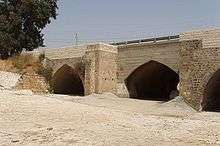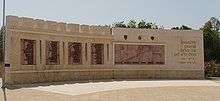Ad Halom
Coordinates: 31°46′00″N 34°39′58″E / 31.76667°N 34.66611°E

Ad Halom (Hebrew: עַד הֲלוֹם) is a site at the eastern entrance to the city of Ashdod, Israel.
Battle
Ad Halom (lit. "up to here") refers to the northernmost point reached by the Egyptian army in Operation Pleshet, one of the battles of the 1948 Arab–Israeli War. Since then, the term is used in Hebrew to emphasize the last line of defense that must not be defeated. The term was also used in the name of the company "Adallom".
On May 29, 1948, Israel had dispatched four Avia S-199 aircraft, flown by Lou Lenart, Ezer Weizman, Modi Alon and Eddie Cohen, to attack the Egyptians between the Arab village of Isdud and the bridge over the Lachish River. Cohen, a Machal pilot from South Africa, was shot down by anti-aircraft fire, becoming the first casualty of the fledgling IAF. The Givati Brigade blew up the bridge and defended the river bank from a pillbox during Operation Barak. The Egyptian Army later took up positions at the site, which saw two battles in mid-1948.
The Egyptian forces were later defeated in Operation Yoav; the pillbox and defensive wall remain as memorials of the events.
Monument
As part of Camp David Accords between Israel and Egypt a monument in the memory of the fallen Egyptian soldiers was established. It was compensation for the abandonment of Israeli obelisks in the Sinai peninsula. The inscriptions on the four edges are in Hebrew, Arabic, English and hieroglyphs.[1]
Bridge
The Ad Halom Bridge, previously known as the Isdud Bridge or Jisr Isdud,[2] was built over the Lakhish River (Wadi Sukrir/Wadi Fakhira) during the Mamluk period in the 13th century,[2] and re-built by the Ottoman Empire at the end of the 19th century. A parallel railway bridge was added when the coastal railway (Lebanon–Egypt) was laid. After numerous armed raids in the area during the 1936–1939 Arab revolt in Palestine, the British authorities set up a series of pillboxes in the area, one of them next to the bridges.[3] After its destruction in the Independence War, the bridge was reconstructed and upgraded. Today the four-lane Highway 4 crosses the bridge.
Railway station
The Israel Railways started to operate a passenger line to Ashdod in the mid-1990s.
The new railway station was established in 2004. In 2005 the line was extended to Ashkelon.
The short distance between the railway and poor planning of the Ad Halom junction on Highway 4 cause traffic jams. The first stage of new Ashdod Interchange, intended to solve the problem, was opened in October 2008.[4]
-

After a winter storm
-

Ad Halom commemoration wall
-

British Mandate-era pillbox
-

The Egyptian monument
References
- ↑ Na'aman, Ayelet (2009-04-28). "7 fascinating memorials". Ynetnews. Retrieved 2009-04-28.
- 1 2 Petersen, A. (2008): Bridges in Medieval Palestine, in U. Vermeulen & K. Dhulster (eds.), History of Egypt & Syria in the Fatimid, Ayyubid & Mamluk Eras V, V. Peeters, Leuven
- ↑ Yitzhaki, Aryeh (1988). BeIkvot Lohamim, Volume 2 - South (in Hebrew). Tel Aviv, Israel: Barr Publishers. pp. 89–93.
- ↑ "Official message of National Roads Company" (in Hebrew). Iroads.co.il. 2008-10-22.
| Wikimedia Commons has media related to Adhalom. |